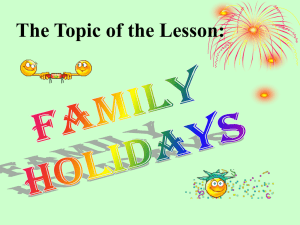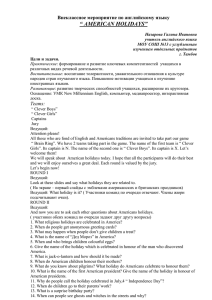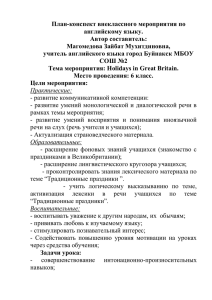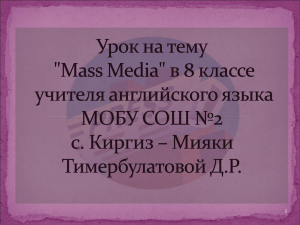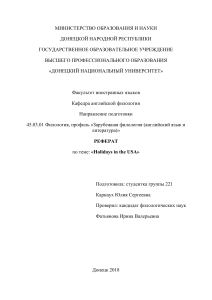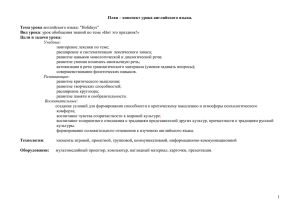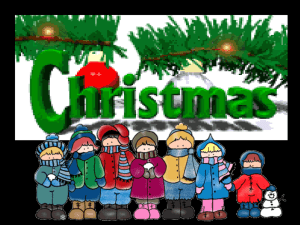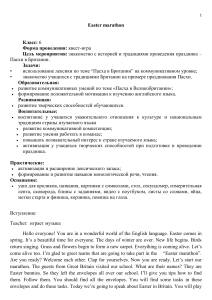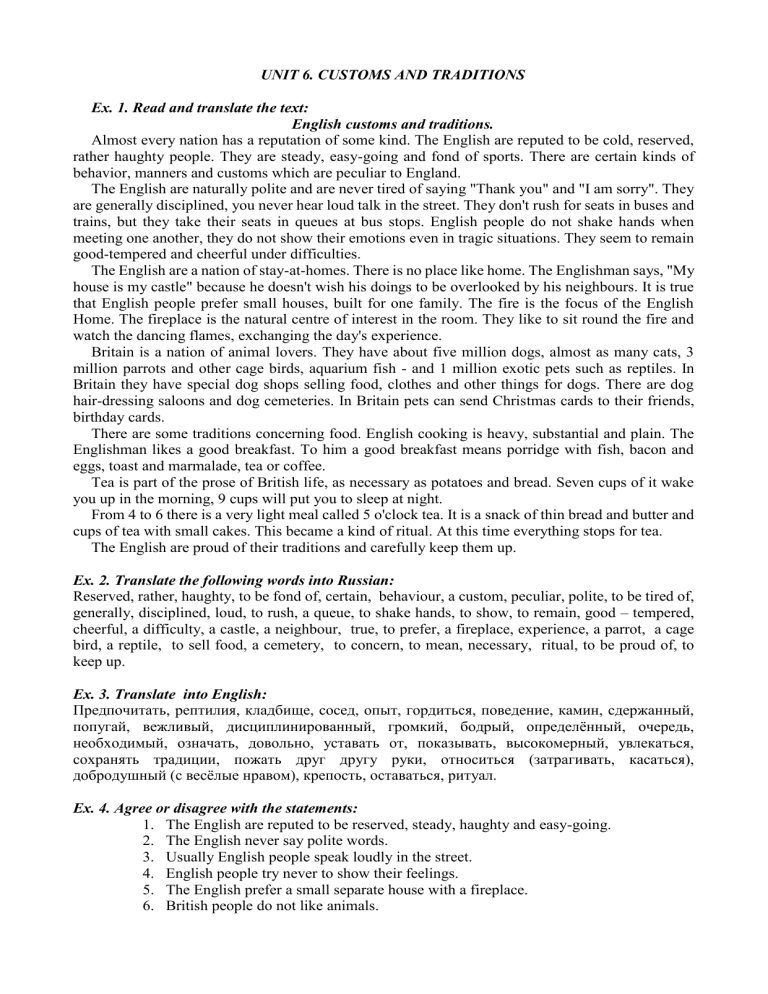
UNIT 6. CUSTOMS AND TRADITIONS Ex. 1. Read and translate the text: English customs and traditions. Almost every nation has a reputation of some kind. The English are reputed to be cold, reserved, rather haughty people. They are steady, easy-going and fond of sports. There are certain kinds of behavior, manners and customs which are peculiar to England. The English are naturally polite and are never tired of saying "Thank you" and "I am sorry". They are generally disciplined, you never hear loud talk in the street. They don't rush for seats in buses and trains, but they take their seats in queues at bus stops. English people do not shake hands when meeting one another, they do not show their emotions even in tragic situations. They seem to remain good-tempered and cheerful under difficulties. The English are a nation of stay-at-homes. There is no place like home. The Englishman says, "My house is my castle" because he doesn't wish his doings to be overlooked by his neighbours. It is true that English people prefer small houses, built for one family. The fire is the focus of the English Home. The fireplace is the natural centre of interest in the room. They like to sit round the fire and watch the dancing flames, exchanging the day's experience. Britain is a nation of animal lovers. They have about five million dogs, almost as many cats, 3 million parrots and other cage birds, aquarium fish - and 1 million exotic pets such as reptiles. In Britain they have special dog shops selling food, clothes and other things for dogs. There are dog hair-dressing saloons and dog cemeteries. In Britain pets can send Christmas cards to their friends, birthday cards. There are some traditions concerning food. English cooking is heavy, substantial and plain. The Englishman likes a good breakfast. To him a good breakfast means porridge with fish, bacon and eggs, toast and marmalade, tea or coffee. Tea is part of the prose of British life, as necessary as potatoes and bread. Seven cups of it wake you up in the morning, 9 cups will put you to sleep at night. From 4 to 6 there is a very light meal called 5 o'clock tea. It is a snack of thin bread and butter and cups of tea with small cakes. This became a kind of ritual. At this time everything stops for tea. The English are proud of their traditions and carefully keep them up. Ex. 2. Translate the following words into Russian: Reserved, rather, haughty, to be fond of, certain, behaviour, a custom, peculiar, polite, to be tired of, generally, disciplined, loud, to rush, a queue, to shake hands, to show, to remain, good – tempered, cheerful, a difficulty, a castle, a neighbour, true, to prefer, a fireplace, experience, a parrot, a cage bird, a reptile, to sell food, a cemetery, to concern, to mean, necessary, ritual, to be proud of, to keep up. Ex. 3. Translate into English: Предпочитать, рептилия, кладбище, сосед, опыт, гордиться, поведение, камин, сдержанный, попугай, вежливый, дисциплинированный, громкий, бодрый, определённый, очередь, необходимый, означать, довольно, уставать от, показывать, высокомерный, увлекаться, сохранять традиции, пожать друг другу руки, относиться (затрагивать, касаться), добродушный (с весёлые нравом), крепость, оставаться, ритуал. Ex. 4. Agree or disagree with the statements: 1. The English are reputed to be reserved, steady, haughty and easy-going. 2. The English never say polite words. 3. Usually English people speak loudly in the street. 4. English people try never to show their feelings. 5. The English prefer a small separate house with a fireplace. 6. British people do not like animals. 7. English cooking is very light and tasty. 8. Tea is the British national drink. Ex. 5. Finish the following sentences according to the text: 1. The English are reputed to be … . 2. The English are polite and are never tired of … . 3. They don't rush for … . 4. The English do not show their emotions … . 5. The English is a nation of … . 6. English people prefer small houses … . 7. Britain is a nation of … . 8. English cooking is … . 9. Tea is … . 10. 5 o'clock tea is … . 11. The English are proud of … . Ex. 6. Answer the following questions: 1. What are the peculiar features of the English? 2. Why are the English a nation of stay-at-homes? 3. Where does the English family prefer to live? 4. Why do the English like to sit round the fire? 5. Do the English show great love for animals? 6. What is an Englishman’s idea of a good breakfast? 7. When do the English have the third meal of the day? 8. Why are the English proud of their traditions and carefully keep them up? Ex. 7. Read and translate the text: Peculiar traditions in Russia. Russia is indeed a unique country, which, along with highly developed modern culture carefully preserves the national traditions deeply rooted not only in the Orthodox religion but also in paganism. The Russians still celebrate pagan holidays, many people believe in numerous omens and legends. Christianity gave Russians such great holidays as Easter and Christmas, and Paganism – Maslenitsa (Shrovetide) and Ivan Kupala. Old traditions are passed on from generation to generation. Easter is the day of the resurrection of Christ. The holiday came to Russia from Byzantium together with Russia’s christening in the end of the 10th century. Since then, this Christian holiday has been widely celebrated all over Russia. Christmas is the holiday of the birth of Jesus Christ, the Savior of the world, whose advent gave people hope for mercy, kindness, truth and eternal life. The Orthodox Church observes Christmas according to the Julian Calendar, on January 7, while Western churches celebrate it on December 25, in accordance with the Gregorian Calendar. Maslenitsa is an Old Russian Tradition. In the old days Maslenitsa was for remembrance of the dead. So the burning of the figure of Maslenitsa means her funeral, and blini (pancakes) – coliphia. But with time the Russians longing for fun and entertainment turned the sad holiday into jolly Maslenitsa with blini - round, yellow and hot as the sun, sledding and horse sleigh riding, fistfights and mother-in-law chatting. The rituals of Maslenitsa are very unusual and interesting because they combine the end of the winter holiday rituals and the opening of new spring festivals and ceremonies, which were to promote a rich harvest. Among the Russian traditions, the wedding has always been a kind of performance with a kind share of improvisation that is why it could be different eve in two neighboring towns. Yet, despite these differences, there was a certain order of wedding ceremony that repeated from village to village, from town to town. Ex. 8. Answer the following questions on the text: 1. What traditions are preserved in Russia? 2. Where did the tradition of celebrating Easter come from? 3. When is Christmas celebrated in Russia? 4. What rituals is Maslenitsa devoted to? 5. Why is the wedding a kind of performance? Ex. 9. Read the dialogue: “PUBLIC HOLIDAYS” A: Can you name some of the main public holidays in the U.S.A.? B: Do you mean those which are celebrated in all the states? A: Yes, that’s exactly what I mean. B: Well, I’ll try. Let’s start with the first holiday in the year – New Year’s Day. A: I’m sure on this day all the banks, stores, factories and educational establishments are closed, aren’t they? B:They are. People do not go to bed until after midnight on December 31st. A: Sure, people everywhere like to see the old year out and the New Year in. B: Such a holiday as Decoration Day or Memorial Day, as it is also called, is observed in most states of the U.S. as a day of remembrance for all Americans killed in wars. A: When is Decoration Day observed? B: On the last Monday in May. A: I’ve heard that on this day patriotic songs are sung on the radio and TV. B: That’s true. A: Which is the biggest national holiday in the U.S.A.? B: It’s Independence Day, or it is simply called The Fourth of July. A: On the 4th of July, 1776, the Declaration of Independence was signed and adopted, wasn’t it? B: You are right! That’s when the event took place. A: Did that event take place in New York City? B: No, not in New York City, in Philadelphia. A: How is the holiday celebrated? B: It is celebrated with firing of guns and fireworks, parades and patriotic speeches. A: Veteran’s Day is another public holiday which is celebrated throughout the U.S.A., isn’t it? B: Right you are! They celebrate Veteran’s Day by holding parades and ceremonies in honor of those who fell in the World Wars. A: By the way, when is Veteran’s Day celebrated? B: It’s celebrated every year on November 11th. A: I have also heard of the holiday called “Thanksgiving Day” ? B: Yes, it’s celebrated in November. Thanksgiving Day comes on the fourth Thursday in November. A: Do you know how the holiday originated? B: I do. The Pilgrims celebrated their first harvest festival in America way back in 1621 and called it Thanksgiving Day. A: Do you mean to say that it has been celebrated since then? B: That’s exactly what I mean. A: Christmas is the most widely celebrated Christian holiday, isn’t it? B: Yes, it is celebrated on December 25th. A: I’ve heard that Christmas customs are centuries old. Is that true? B: It is. When Christmas comes, people usually wish one another a Merry Christmas and a Happy New Year. A: You haven’t mentioned a few other holidays observed by the Americans. В: No, I haven’t. The thing is that they are not observed by the whole nation. A: One of them is Martin Luther King, Jr. Day, isn’t it? B: It is. That holiday is observed on January 15th. A: In February they observe Lincoln’s Birthday and Washington’s Birthday, don’t they? В: They do. Besides, on February 14th they observe Valentine’s Day . A: Then the Americans have an annual day of commemoration of mothers and fathers, I’ve heard. В: Mother’s Day is observed on the second Sunday in May. A: And Father’s Day falls on the third Sunday in June, if I’m not mistaken. В: Here’s another holiday – Labor Day. It’s celebrated on the first Monday in September in honor of labor. A: Yes, but in many other countries May Day (May 1st) is the workingman’s holiday. В: The discovery of America is commemorated by a holiday in October called Columbus Day. But not all the 50 states observe that holiday. A: Halloween is also celebrated in October. The holiday falls on October 31st of each year. That’s when children go in costumes from door to door begging treats or playing pranks. В: Children like that holiday, don’t they? A.: They love it. Ex. 10. Answer the questions. 1. Is New Year’s Day widely celebrated in the United States? 2. New Year’s Day isn’t a working day, is it? 3. Do most of the people sit up to see the old year out and the New Year in? 4. Is Decoration Day observed in all the states of the U.S.A.? 5. What kind of songs are sung on this holiday? 6. Which is the biggest national holiday in the U.S.A.? 7. When was the Declaration of Independence signed? 8. Was the Declaration of Independence signed in New York City or in Philadelphia? 9. When is Veteran’s Day celebrated by the Americans? 10. How is Veteran’s Day celebrated? 11. When is Thanksgiving Day celebrated in the U.S.A.? 12. How and when did this holiday originate? 13. How many years ago did the holiday originate? 14. Which is the most widely celebrated religious holiday? 15. Is Christmas celebrated on December 25th or January 1st? 16. What do people wish each other during the Christmas holiday? 17. Are all the American holidays observed by all the states? 18. When are Lincoln’s Birthday and Washington’s Birthday observed? 19. Is Mother’s Day observed in May or in June? 20. Father’s Day is observed in May too, isn’t it? 21. Is the discovery of America commemorated by a holiday? 22. Why do children love Halloween? Ex. 11. Say it in English: 1. День независимости — самый большой национальный праздник в Соединённых Штатах Америки. 2. Американцы отмечают День независимости 4-го июля, не так ли? 3. В этот день была подписана Декларация независимости. 4. Это событие произошло в 1776 году, если я не ошибаюсь. 5. День ветеранов отмечают ежегодно 11-го ноября. 6. Когда отмечают День Колумба? 7. День Колумба также отмечают в нескольких странах Латинской Америки, не так ли? 8. Когда в Америке отмечают День Мартина Лютера Кинга? 9. День труда отмечают также в Канаде. 10. Шестое ноября — день выборов в США. 11. День благодарения ежегодно отмечается в США, не так ли? 12. В каком месяце отмечается этот праздник? 13. Я хотел бы знать, как возник этот праздник. 14. В каком году впервые отмечался День благодарения? 15. Когда американцы отмечают Рождество? 16. В этот день американцы украшают свои квартиры и дома ёлками. Ex. 12. Read and translate the text: HOLIDAYS IN GREAT BRITAIN The most popular holidays in Great Britain are: Christmas Day, Boxing Day, New Year’s Day, St. Valentine’s Day, Good Friday, Easter, May Day, Spring Bank Holiday, Late Summer Bank Holiday and Bonfire Night. In Great Britain, as well as in the USA and Canada, Christmas is celebrated on the 25th of December. In London there is a big Christmas tree in Trafalgar Square. It is a present from the people of Norway to the city of London. In most families a Christmas tree is put up and decorated in the front corner of the room. There is a good tradition to buy gifts for the family, children and friends. Family members wrap up their gifts and leave them at the bottom of the Christmas tree to be found on Christmas morning. Children leave a long sock or stocking at the end of their bed on Christmas Eve, 24th December, hoping that Father Christmas will come down the chimney during the night and bring them small presents, fruit and nuts. People also write Christmas cards. Before Christmas housewives make Christmas puddings. When the pudding is ready and still hot they put different things into it, little silver things such as a horseshoe, a ring or a button, and five-penny pieces. The horseshoe brings luck, the ring means marriage, the button means that a person is going to get married. A five-penny coin is a sign of wealth. Boxing Day is celebrated on the 26th of December. Long ago when people went to church on the morning of the 26th of December, they put their donations for the poor into special boxes. So the name of the holiday originates from the word “box”. Later people began to give money or presents to the people they knew personally. And now Boxing Day is a holiday when one gives presents to friends and relatives. They also give presents to the servants, delivery men and postmen. On Boxing Day people visit friends, go for a drive or walk. In cities and towns there is a tradition to go to the pantomime and entertain oneself. New Year’s Day is not celebrated so widely as Christmas. Some people ignore it and go to bed as usual. Others, however, celebrate it in one way or another. They organize a family party or a party for young people or go to a New Year’s dance. In London people like to gather in Piccadilly Circus or Trafalgar Square to welcome the New Year. On the 14th of February the English celebrate St. Valentine’s Day. On this day thousands of people travel to a small village Gretna Green on the border with Scotland to get married. This tradition began in 1754 when in London people could not get married under the age of 21 without their parents’ permission. But in Scotland the permission was not required. On St. Valentine’s Day boys and girls, husbands and wives, friends and sweethearts exchange greetings of love and affection. They send each other Valentine’s cards, flowers and chocolates. Good Friday is a religious holiday. It is Friday before Easter, a holy day of the Christian Church. It is observed to commemorate Christ’s crucifixion and resurrection. Easter is a religious holiday too. It is celebrated in spring. On Easter the British give each other presents – Easter eggs, which are usually made of chocolate. Nowadays Easter eggs are often artificial, made of wood or plastic. Easter eggs are often hidden about the house for the children to find them. On Easter Sunday there is Easter Parade in Battersea Park in London. It begins at 3 p.m. May Day is celebrated on the first of May to commemorate the suppression of demonstrations for the eight hours’ working day in the USA on May 1, 1886. Since then May Day has been celebrated in many countries, including Great Britain and the USA. On bank holidays people who live in town go to the country and to the coast. It the weather is fine, people may arrange a picnic or tea and enjoy their meal in the open air. On these holidays sports competitions and horse races are organized on the stadiums. Ex. 13. Translate the names of the holidays. Christmas Day Boxing Day Good Friday Easter New Year’s Day St. Valentine’s Day May Day Bank Holiday Ex. 14. Find in the text the English equivalents of the following words and expressions. отличать; подарок от жителей Норвегии; украшать рождественскую елку; покупать подарки детям и друзьям; оставлять подарки под елкой; спускаться вниз по трубе; приносить маленькие подарки, фрукты и орехи; писать рождественские открытки; делать рождественский пудинг; серебряные вещицы; приносить счастье; пятипенсовая монета; пожертвования для бедных; происходить от слова «коробка»; навещать друзей; ходить на прогулку; организовать семейный вечер; ехать в маленькую деревню; жениться; до 21 года; посылать открытки, цветы и шоколад; религиозный праздник; святой день христианской церкви; искусственный; наслаждаться едой на открытом воздухе; спортивные соревнования, организованные на стадионах. Ex. 15. Answer the questions. 1. What are the most popular holidays in Great Britain? 2. When is Christmas celebrated? 3. Where is a Christmas tree put up in London? 4. Do most families decorate the Christmas tree? 5. Where do people leave the presents for their children and families? 6. What do the children do before Christmas? Why? 7. What do they hope for? 8. What do housewives make before Christmas? 9. Why do they put different silver things into the pudding? 10. What does the name of “Boxing Day” originate from? 11. What do people do on Boxing Day? 12. Is the New Year’s Day celebrated so widely as Christmas? 13. Where do the Londoners like to gather? 14. Why do people in Great Britain celebrate St. Valentine’s Day? 15. When did the holiday begin? 16. What do people send each other on this day? 17. Why is Good Friday a holy day of the Christian church? 18. How do the English celebrate Easter? 19. When is May Day celebrated? Why? 20. What do people do on Bank Holidays? Ex. 16. Translate into English the words in brackets. 1) Christmas (празднуется) on the 25th of December. 2) In London there is (большая рождественская елка) in Trafalgar Square. 3) It is (подарок от жителей Норвегии) to the city of London. 4) There is a good tradition (покупать подарки семье и друзьям). 5) Before Christmas housewives (готовят рождественский пудинг). 6) On the 26th of December people put their donations for the poor (в специальные коробки). 7) On Boxing Day people (посещают друзей или едут на прогулку). 8) On New Year’s Day the English (организуют семейные вечера). 9) The tradition of celebrating St. Valentine’s Day (берет начало в 1754 году). 10) On St. Valentine’s Day the Britons (посылают открытки, цветы и шоколад своим любимым людям). 11) Easter and Good Friday are (религиозные праздники). 12) The Friday before Easter is (священный день для христианской церкви). 13) On Easter the British give each other (пасхальные яйца, которые обычно сделаны из шоколада). 14) On Bank Holidays people who live in town (уезжают за город или на побережье). 15) They arrange a picnic or (принимают участие в спортивных соревнованиях на открытом воздухе). Ex. 17. Choose the words connected with the definite holiday. the 25th of December; silver things; the 14th of February; a big Christmas tree; 1754; a word “box”; spring; to go for a drive; gifts; to organize sports competitions; postmen; a present from Norway; suppression; to go to church; Christmas cards; to go to a New Year’s dance; a family party; to arrange a picnic; a small village; a religious holiday; a religious holiday; to go to the pantomime; Christmas pudding; Piccadilly Circus; exchange greetings; Trafalgar Square; chocolate eggs; Easter Parade. Valentine’s cards; Ex. 18. Complete the sentences. 1. Christmas is celebrated … . 2. In London there is a big tree … . 3. In most families a Christmas tree … . 4. There is a good tradition … . 5. Before Christmas housewives … . 6. Boxing Day is celebrated … . 7. Long ago on the morning of the 26th of December … . 8. Later people began … . 9. Now Boxing Day is a holiday … . 10. On Boxing Day people … . 11. On New Year’s Day people organize … . 12. The English celebrate St. Valentine’s Day … . 13. This tradition began when … . 14. People send each other … . 15. Good Friday is a religious holiday before … . 16. It is observed … . 17. On Easter the British … . 18. May Day is celebrated … to commemorate … . 19. On Bank Holidays people … . 20. They arrange a picnic … . Ex. 19. Is it true or false? 1) Christmas is celebrated on the first of December. 2) In London there is a big Christmas tree in Trafalgar Square. 3) The English don’t decorate a Christmas tree in their homes. 4) Before Christmas housewives make Christmas pudding. 5) They put potatoes in the pudding. 6) Boxing Day is celebrated on the 26th of December. 7) The name of the holiday originates from the word “boxing”. 8) On Boxing Day people go for a drive or walk. 9) New Year’s Day is celebrated as widely as Christmas. 10) 11) 12) 13) 14) 15) In London people don’t like to gather in Piccadilly Circus or Trafalgar Square. On the 14th of February the English go to London. On St. Valentine’s Day people send each other books and pens. On Easter the British give each other Easter eggs which are made of glass. On the first of May the English celebrate May Day. On Bank Holidays people go to the country to arrange a picnic. Ex. 20. Translate into English: 1. На Рождество англичане украшают рождественскую елку и покупают подарки детям и друзьям. 2. Домохозяйки готовят рождественский пудинг. Они кладут в него маленькие серебряные вещи. 3. Название праздника «Boxing Day» происходит от слова «коробка». 4. В этот день англичане посещают своих друзей или едут на прогулку. 5. Новый год не отмечается так широко как Рождество. 6. Но в Лондоне люди любят собираться на Пикадили или Трафальгарской площади, чтобы встретить Новый год. 7. В день Святого Валентина тысячи людей едут в маленькую деревушку на границе с Шотландией, чтобы вступить в брак. 8. Мальчики и девочки, мужья и жены, друзья и влюбленные обмениваются приветствиями в знак любви и уважения. 9. Страстная пятница – это праздник, который напоминает о распятии и воскрешении Христа. 10. Первое мая празднуется во многих странах, включая Великобританию и США, в память о первом мае 1886 года, когда в США были подавлены демонстрации за 8 часовой рабочий день. DO YOU KNOW THAT … English taps in bathrooms and kitchens are different from the ones used in Europe. In England they have two taps – a hot and a cold tap on each side of the basin, instead of the tap with which you can mix the temperature of the water. In most countries cars drive on the right side of the road. In England (and a few former colonies) they drive on the left–hand side of the road. The English police do not carry guns. They are the only police force in the world not to be armed. The BBC (British Broadcasting Corporation) channels of British TV do not show any adverts – only programmes. English measures of length are: a mile – 1609 m. a yard – 91 cm. a foot – 30 cm. an inch – 2,5 cm. English measures of weight are: a stone – 6 kg. a pound – 454 g. an ounce [auns] – 31 g. English measures of liquids are: a gallon ['gælәn]– 4,54 lit. a pint [paint] – 0,75 lit. Up to 1971 English money with its pennies, shillings and pounds was not based on the decimal system: 12 pence for a shilling, 20 shillings for a pound, 21 shillings for a guinea [‘gini]. The latter got its name from the first coin struck from gold on the coast of Guinea. In 1971 Britain changed over to decimal currency system – 100 new pence to the pound (£). New coins or pieces were introduced: the ½ p., 5 p., 10 p., 20 p. and 50 p. coins. “The Daily Express” is a “popular” paper for those who prefer entertainment to information. It is largely filled with sporting news, accounts of crime, advertisements (ads), gossip of little worth (about private life of society people, from stars, etc) and strip cartoons. Other popular papers are “The Sun”, “The Daily Mirror”, “The Daily Mail”. This kind of newspapers is called tabloids. “The Daily Telegraph” is a daily London newspaper of conservative orientation. It is a “quality” paper for educated readers who are interested in important domestic and foreign news. Other quality papers are “The Observer”, “The Guardian”, “The Times” and “The Independent”. WHY THE BRITISH DO AND SAY SO Is John Smith really Britain’s most common name? John Smith is indeed Britain’s most common name. “Smith” originally meant a foundry man or a metal worker as in Blacksmith, Ironsmith, Coppersmith and so on. It became a term meaning people who worked with their hands. Before Industrial Revolution the majority of families in Britain were peasants, illiterate and named after their profession or residence. Those who could not spell his own name were called “Smith”. “John Smith” is one of those shot, sweet, virtually phonetic Biblical names that are simple and plain. Many names come and go but John Smith lives on forever. There are about a million and a half Smiths in England and Wales. Why do the British drive on the wrong side of the road? Visitors to the British Isles need extra courage to drive on what for them is the”wrong” side of the road. After the tourists leave the airport they are bombarded with signs which remind them to keep to the left. But in spite of this hundreds of accidents happen annually with inexperienced travellers who don’t know which side of the road they should be on. Academics found out that the English can claim two millennia of keeping road left to Roman invaders. The Romans liked to keep their right arm free to grab a sword from across their bodies on the left hip. They also liked to keep the whip hand free to crack it over the backs of oxen and horses. We know who lives in at № 10, but who lives in the rest of Downing Street? № 10 Downing Street has been the official residence and official office of the British Prime Minister since 1735. The house is one of the three houses which still remain. They were built by Sir George Downing, who obtained the lease on the site in 1860. The other house № 11 is the official residence of the Chancellor Exchequer. The ground floor and the basement of house № 12 are used as offices. This house is also the home of the corner shop selling all manner of food and drink during all hours at night. What is the national costume in England? The English don’t have the national costume. The costume that most expresses the spirit of the English is that of a shepherdess for the female, i.e. a peasant blouse, a skirt, a laced waistcoat, a petticoat, stockings, buckled shoes and a sleeveless coat. The national costume of England has never stood still, but like its society has evolved through the ages. It now stands as: denim, jeans, trainers, and football shirts with regional variations. We can also see national dress each year in Spanish resorts. The “Brit on Tour” wears a string vest, a knotted hanky on the head and turned trousers. Who invented the kilt? The first type of kilt was made in Scotland in the XVI century. It was originally one item which was cut above the knee and belted in the middle. In the XVIII century it was made into a two – piece item of clothing consisting of a little kilt and a tartan plaid. Tartan design originates from Holland and kilt from England. Tartans eventually became part of uniforms which differentiated new regiments of army. Another version says that the kilt was invented by the Romans and was worn by all ranks in the Roman legions. Naturally the higher the rank the better the quality and design. Why do the British say “dressed to the nines”? The expression “dressed to the nines” has come from a term going back many hundred of years. The expression “dressed to the eyes” (meaning pleasing to the eye) in Old English was written as “to then eyne”. So it is easy to see how this has become now “to the nines”. This expression is also connected with the price of admission to entertainment places of the past. The most expensive seats often cost nine pence, and were referred to as the “nines”. To be dressed to the nines meant that one was beautifully dressed for the best seats in the house. Why there is tradition of putting candles on the birthday cake. The custom of using lighted candles is connected with the Greeks. They made honey cakes in the shape of the moon and lit them with tapers. These cakes were placed on the altar of Artemis. Candles were meant to protect the birthday celebrant from evil spirits and to ensure security for the coming year. Astrologers consider the sun’s position at birth to indicate the strength of a person’s heat and the measure of vital energy. It is our battery power on which we run and it is recharged annually when the sun reaches the same birth position. That’s why people wish each other “Many Happy (Solar) Returns”. Just before our birthday we feel weak. Our energy runs low and so the candle flames are a symbolic reassurance that the spirit of life in us is renewed. The older we get the more candle power we need to give us new hope for the year ahead. English national pottery. The “Father of English Pottery” was Josiah Wedgwood. In 1759 he founded the Wedgwood firm. This firm invented and produced a wide range of tableware and ornamental wares. Wedgwood’s greatest achievement and contribution to British pottery industry was his development and production of cream coloured earthenware. Inexpensive and beautiful, this new tableware became very popular among people all over the word. Fine bone china was first made by the firm in 1812 — 1822 and has been made by the company ever since. Fine bone china is made from three main raw materials — china stone, china clay and oxbone. It is the bone (reduced to a fine ash) that gives china its whiteness, translucency and above all its amazing strength. Cup of tea. The English custom of afternoon tea goes back to the late XVIII century. Anne, wife of the 7th Duke of Bedford, decided that she suffered from a “sinking feeling” around 5 p. m. and needed tea and cakes to bring back her strength. Before long complains were heard that the “labourers lose time to come and go to the tea — table and farmers’ servants even demand tea for their breakfast”. Tea had arrived fashionable. Tea Rooms were opened for high society, and soon tea became the national drink of all class. Today the British drink more tea than any other nation an average of 4 kilos a head per annum or 1,650 cups of tea a year. They drink it in the bed in the morning, round the fire on winter afternoon and out in the garden on sunny summer days. In times of trouble the kettle is quickly put on, the tea is made and comforting cups of the warm brown liquid are passed round. The British first heard of tea in 1598, and first tasted it in about 1650. For nearly two centuries all tea was imported from China until, in 1823 a tea plant was found growing naturally in Assam in India. Sixteen years later the first eight chests of Indian tea were sold in London and today London’s tea markets deal in tea from India, Sri Lanka (Ceylon), and Africa more than China. Tea making in England is an art. The hostess first of all rinses the teapot with boiling water (this is called “warming the pot”) before adding four or five teaspoonfuls of tea. The amount of tea varies, of course, according to the number of people present. T he pot is then filled with boiling water and covered by a tea-cosy to allow the tea to infuse or draw for five minutes. English people seldom put lemon or rum in their tea. Tea is not a meal at all, but a suitable occasion for social intercourse when people often come in for a chat over their cup of tea. There two kinds of tea:”afternoon tea” and “high tea”. “Afternoon tea” takes place between three-thirty and four-thirty and consists of tea, bread, butter and jam, followed by cakes and biscuits. “High tea», however, is a substantial meal and is eaten between fivethirty and six-thirty by families which do not usually have a late dinner. In a well-to-do family it will consist of ham or tongue and tomatoes and salad, or a kipper, or tinned salmon, with strong tea, bread and butter followed by stewed fruit, or tinned with cream or custard and cake. What is the English pub? Where do you think most tourists go when they visit Britain? It is the Buckingham Palace? Stratford-on-Avon? Oxford? They spend most of their time visiting the pub. The most popular drink in the pub is beer. You can have a glass of it, called a pint, or a small glass which the English call half. If you want English beer, you ask for “bitter” because in England beer is a very general word and can mean “lager”. Most pubs are owned by a brewery, the factory that makes the beer. These sell only the beer made by that brewery. There are two things that confuse foreigners. The thing is that a lot of pubs have the same names. The most popular pub names are: “The Red Lion”, “The Crown”, “The White Hart”. Another confusing thing about pubs is their opening and closing times. English pubs open at 10:30 in the morning and close at 2:30 in the afternoon. They open again at 5:30 and close at 11:00. But on Sundays the pubs open one and a half an hour later, and close half an hour earlier. But in Scotland, Wales and Ireland, opening and closing times are completely different. The game of darts. It is a traditional English game. In the bar of every English pub there is a dart – board and on most evenings the game of darts is being played. This traditional English game developed from archery. During the Middle Ages archery was much encouraged for military reasons. The first record of something like the modern game of darts appears in a 16th century description of a tournament where people threw missiles at a target by hand instead of using a bow. In 1620 the Pilgrim Fathers started to America in search of greater freedom. They sailed in the Mayflower and they played darts during their voyage. What is the game of darts? The dart – board has numbered sections. The darts are small above five inches long. They have a steel point, a metal body and three feathers. The players throw the darts at a target by hand. The score depends on the section in which the dart lands. A set of three darts is used during each game and each player throws them in turn. Usually expert players have their own private set of darts. But the pubs always provide occasional performers with a set of darts. Style is a matter for the individual. Each player must have a good eye and steady hand. But it is not always easy in a pub. The fireplace in English homes. Until recent times the fireplace in English homes has always been the natural centre of interest in a room. For many months of the year the English like to sit round the fire and watch the dancing flames. In the Middle Ages the fireplaces in the halls of large castles were very wide. Only wood was burnt in such fireplace. Large logs were carted in from the forests and were put on metal bars which were made to support the logs while they were burning. In some of such fireplaces there were even seats inside. Such wide fireplaces may still be seen in old inns. Elizabethan fireplaces were very high. Sometimes they even reached to the ceiling. Most of them had carved stone or wood work over the fireplace. Sometimes there were columns on each side of the fireplace. In the 18th century above the fireplaces special space was provided for a painting or a mirror. When coal fires became common, fireplaces became much smaller. Grates were used to hold the coal. Above the fireplace there was usually a shelf on which there was often a clock and perhaps framed photographs. Be careful to use English words. Do you know where the word “sandwich” comes from? It came from the name of an English politician John Sandwich (1718 – 1792). The Earl was very fond of gambling. He invented sandwiches in order to be able to eat without leaving the gambling table. He also gave the name to the Sandwich Islands, which are now called Hawaiian Islands. A sandwich – man is not a man who sells sandwiches. It is a man who works about the streets carrying advertisements on two boards. One hangs over his chest and the other on his back. The word “hamburger” comes from the name of German city of Hamburg and not from the word “ham”. The word “cheeseburger” sometimes used to mean a similar kind of sandwich with cheese instead of meat. Why the British say so Why are unwanted objects called “White Elephants”? The phrase “white elephants” dates back to the times when India and Thailand were British colonies. A white elephant lives mainly in Thailand. Within the Buddhist religion the white elephant is a sacred animal. When Thailand was called Siam the kings kept the elephants because of their sacred position. The white elephants were kept in absolute splendour. If the kings of Siam wanted to ruin a person, they could do so by giving a gift of a white elephant to that person. In what way could the white elephant ruin person? On the one hand the person who was presented with the elephant couldn’t give the gift away. On the other hand he couldn’t afford the great expense of keeping such a sacred animal in splendour. In the 11th century peasants in India used to sell their unwanted household goods from the back of an elephant. The elephants often turned white with fear when they saw crowds of people in the streets. So the phrase “white elephant” was applied to any unwanted item. Why do people say “touch wood”? The expression “to touch wood” comes from the practice of touching relics of the body or possessions of holy people in times of personal distress when a person asked for blessing and relief. People said that a large number of those relics were from the cross of Jesus Christ. In fact, touching wood was ancient superstition when in such a way people hoped to avert bad luck. Such trees as oak and willow were considered to be sacred and people believed that they had strong protective powers. Now the actual type of wood has become unimportant and any wood or even one’s head is touched. This superstition has been changed in meaning through centuries. Today people say “touch wood”, “knock on wood” or “keep your fingers crossed” when they want to avoid misfortunes and hope for good luck and prosperity. Why do people say “bless you” when someone sneezes? For many hundreds of years there was a tradition to say “God Bless You” to anyone who sneezed. People believed that the force of a sneeze forced the soul from the body and the heart stopped beating. When anyone heard a sneeze nearby he said “God Bless You”. Using these words he tried to help the soul of a sneezing person to find its way back. This phrase of saying “Bless You” to a sneezing person originated from Pope Gregory the Great in the 6th century. He recommended to use these words after an outbreak of plague in Rome and called for prayers as protection against infection. Does life really begin at forty? This expression originates from Roman times. It was considered an honour for a family to send their daughter on her tenth birthday into the Temple of Vestal. The girl would remain in the temple for the next 30 years. She lived a simple life of vestal virgin in prayer abstinence and charity work. Even to see a man was forbidden and would result in expulsion. On her fortieth birthday the unfortunate (or fortunate) lady would be released and begin her new life as soon as possible. There is another explanation of the saying. The French say that we spend twenty years growing, twenty years working and twenty years living. This probably dates back to a time when the life expectancy in France was only 60 years or so. In reality life does not begin at forty, but it makes people live in hope for another forty years.
